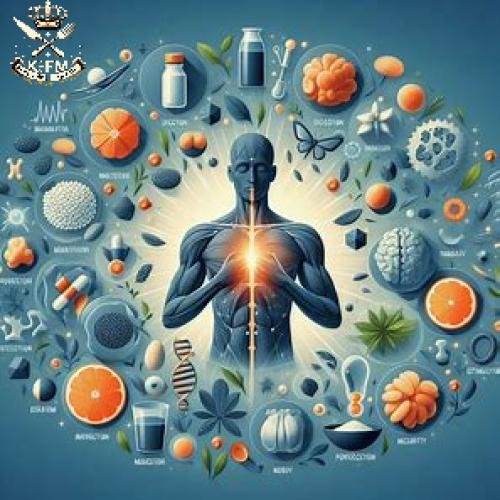Fasting is one of the acts of worship that offers many health benefits for the body, as it contributes to improving organ functions and enhancing general health. During the fasting period, the body has an opportunity to get rid of toxins and impurities, which helps in boosting the immune system. Fasting also enhances fat burning and improves blood sugar levels. Other benefits of fasting include improving cardiovascular health by reducing harmful cholesterol levels. Fasting also provides the body with essential vitamins such as Vitamin C and D, which strengthen the immune system, along with B vitamins that support energy and mental performance.

Our topic today discusses the health benefits of fasting, a subject that has occupied the minds of many recently. Many scientists from various scientific schools around the world acknowledge the immense benefits of fasting, based on hundreds of experiments and research they have conducted on diverse groups of people, whether they are overweight or thin, sick or healthy.
1- For those suffering from thinness or muscle weakness, they notice an increased desire for food after fasting, which helps them gain weight and reach their ideal weight.
2- For those suffering from obesity, they can lose more than 10 kilograms per month and maintain this weight after fasting, which benefits their health.
3- For healthy individuals, they show greater tolerance to fasting if they follow a plant-based diet and avoid overeating meat.
4- For patients, fasting purifies the body from toxins and excess fats, and increases metabolic capacity, which helps in building tissues and cells.

Frequently Asked Questions:
- Can fasting negatively affect people with chronic diseases?
- Yes, people with chronic diseases such as diabetes and heart conditions may face challenges during fasting. For example, fasting can affect blood sugar levels in diabetic patients and increase the risk of hypoglycemia or hyperglycemia. Therefore, it is recommended that these individuals consult a doctor before starting fasting.
- Does fasting contribute to improving mental health?
- Yes, some studies have shown that fasting can contribute to improving mental health by increasing the levels of certain hormones like serotonin and dopamine, which are known as "happiness hormones." Other studies have indicated that fasting can improve mental focus and reduce anxiety and stress levels.
- Can fasting lead to vitamin or mineral deficiencies in the body?
- If fasting is done for long periods without consuming a balanced diet, deficiencies in some essential vitamins and minerals may occur. For example, a deficiency in vitamin D or B12 may happen if the proper foods are not consumed. However, this can be avoided by eating balanced meals during the iftar and suhoor hours, along with vitamin supplements if needed.
- How can fasting affect energy levels throughout the day?
- Some people may notice an increase in energy levels after a period of adjustment to fasting, especially if healthy foods containing proteins and complex carbohydrates are consumed. On the other hand, others may experience fatigue during the early days of fasting due to lack of sleep or not eating a balanced diet. It's important to ensure adequate intake of water and nutritious food to reduce fatigue.
Risks of Fasting: Despite the numerous benefits of fasting, it can pose some risks for individuals with chronic diseases. For instance, people with diabetes may find it difficult to regulate their blood sugar levels while fasting, which could lead to severe low or high blood sugar levels. For individuals with heart disease, fasting may have unwanted effects on blood pressure or cholesterol levels.
Practical Tips for Healthy Fasting:
- Eat balanced meals during iftar and suhoor: It is recommended to eat foods rich in proteins, fibers, and healthy fats to help the body endure the fasting hours. For example, consuming eggs, yogurt, and whole grains during suhoor can provide the body with necessary energy.
- Drink adequate amounts of water: It is advisable to drink plenty of water between iftar and suhoor to avoid dehydration, along with fresh juices that contain minerals and vitamins.
- Avoid fatty and fried foods: Fat-rich foods may lead to fatigue or excessive thirst during fasting.
Types of Fasting: There are various types of fasting that can be followed, each with its own benefits and purposes:
- Intermittent Fasting: Involves refraining from food for specific periods during the day, such as fasting for 16 hours and eating during an 8-hour window (16:8 method). This type contributes to improving metabolism.
- Water Fasting: Involves refraining from all food and drinks except water for a specified period. It is one of the more extreme fasting methods and can help detoxify the body, but it is important to consult a doctor before starting this type of fasting.
In conclusion, fasting is a beneficial and healthy method for the body if used in the correct and prescribed way, contributing to the restoration of health and strength for thousands of people. We ask Allah for health and wellness for us and for you. Peace be upon you.
Note: This recipe is suitable for all individuals who do not suffer from any allergies or negative reactions to the ingredients mentioned.
Warning: This recipe is not suitable for individuals who are allergic to any of the ingredients used. Please ensure to consult a doctor if you have any doubts about consuming this recipe.




















